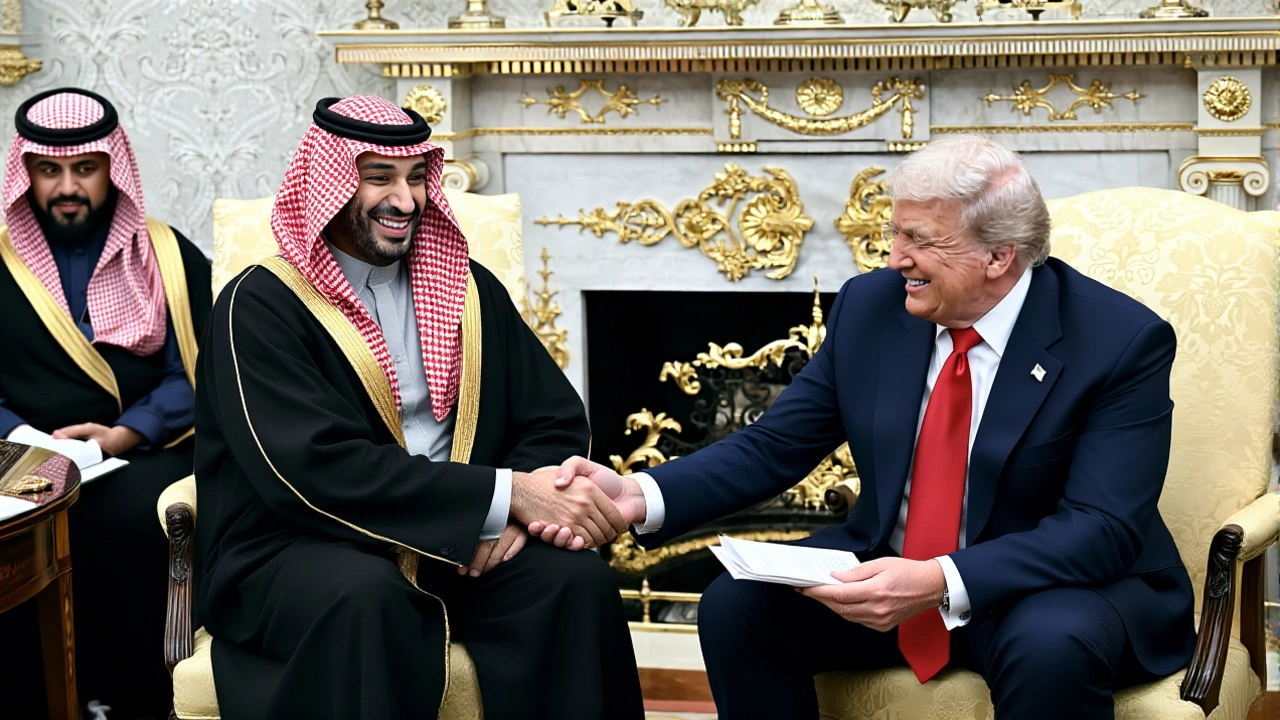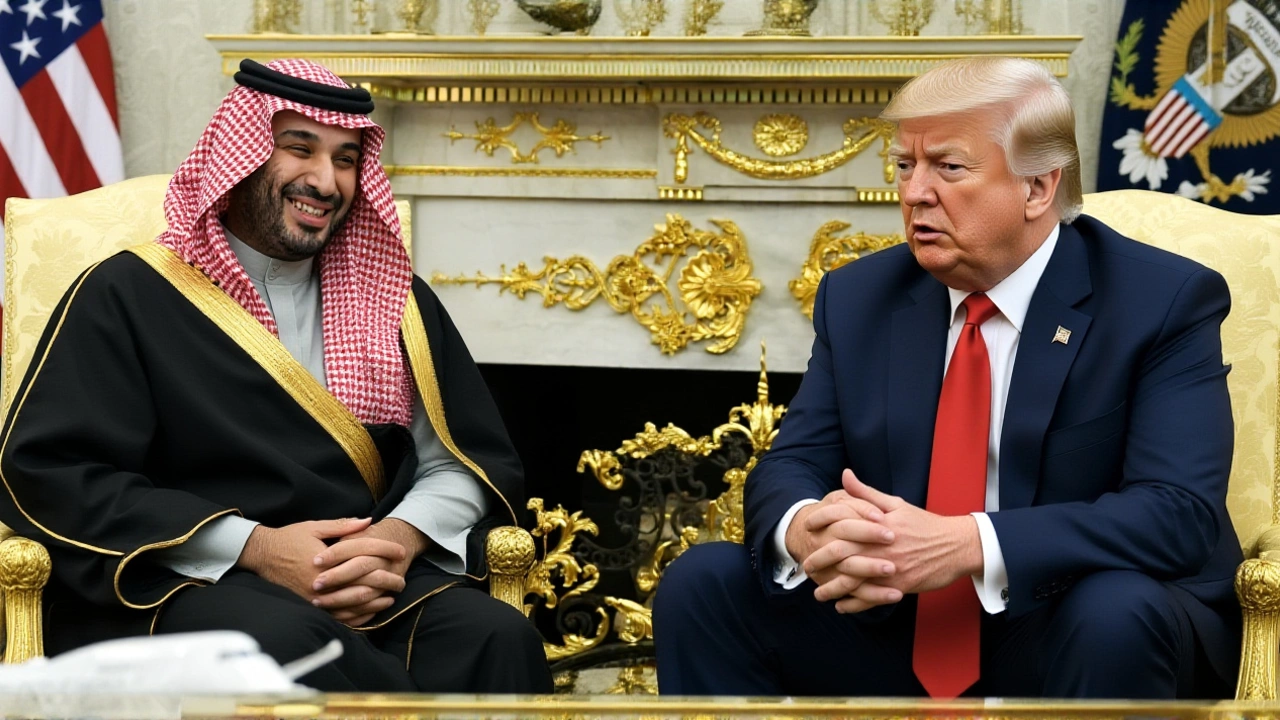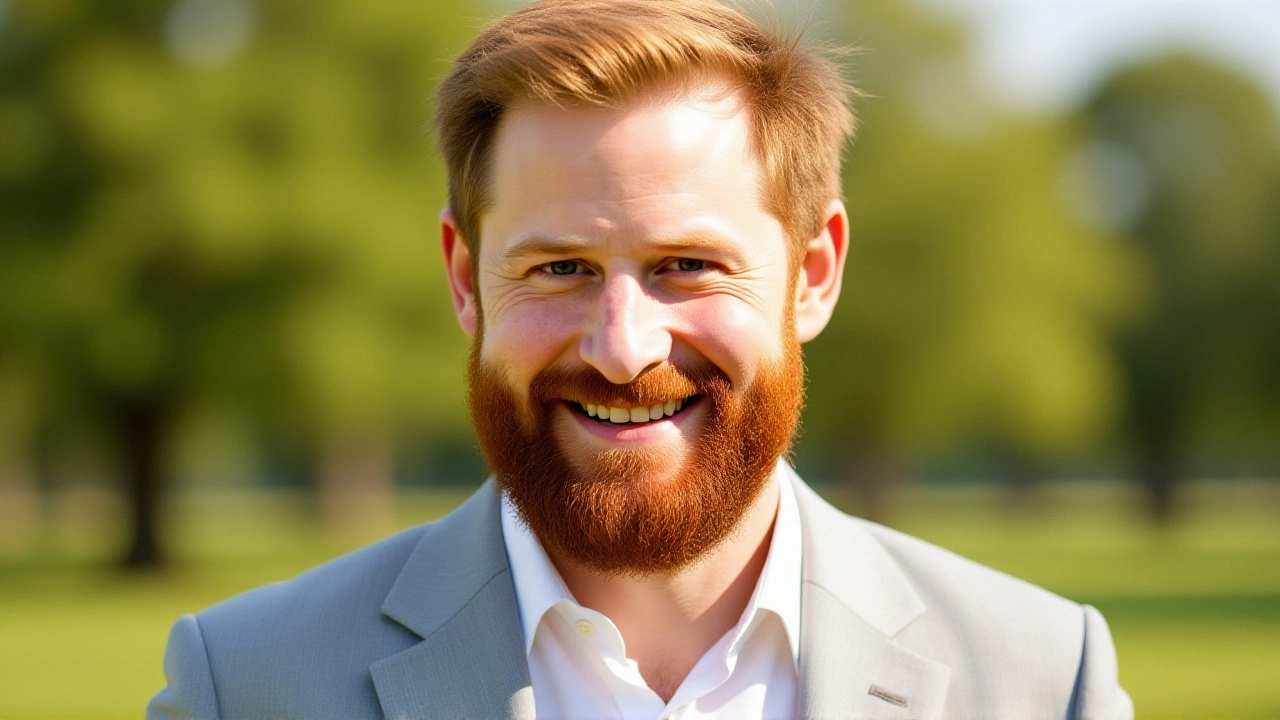Vindman Demands Trump Release 2019 Call Transcript with Saudi Crown Prince After Khashoggi Defense
 Nov, 20 2025
Nov, 20 2025
On Wednesday, November 19, 2025, Eugene Victor Vindman, a former White House National Security Council staffer and current U.S. Representative from Virginia’s 7th District, stood on the floor of the U.S. Capitol Building and delivered a searing call for transparency: release the full transcript of a 2019 phone call between Donald J. Trump and Mohammed bin Salman, the Crown Prince of Saudi Arabia. The demand came just hours after Trump, in an Oval Office meeting on November 18, defended the prince against longstanding accusations tied to the 2018 murder of journalist Jamal Ahmad Khashoggi. Vindman didn’t mince words. "The American people and the Khashoggi family deserve to know what was said on that call," he said. "If history is any guide, the receipts will be shocking."
Why This Call Matters More Than Ever
Vindman, 49, isn’t just any lawmaker. He served as Director for European Affairs on the National Security Council during Trump’s first term — a role that put him in the room when classified call transcripts were reviewed. He’s one of the few insiders who actually saw the 2019 conversation between Trump and bin Salman. And he says it was one of only two calls he deemed "the most problematic" — the other being the July 25, 2019, call with Ukrainian President Volodymyr Zelenskyy, which led to Trump’s first impeachment. That’s not a minor comparison. The Zelenskyy call resulted in a formal House impeachment over abuse of power. Vindman’s assertion that the Saudi call was equally troubling — and possibly worse — is explosive. It suggests Trump’s foreign policy decisions weren’t isolated incidents, but part of a pattern: prioritizing political alliances over human rights, even when the evidence of atrocities was overwhelming.The Khashoggi Shadow
Jamal Khashoggi, a U.S. resident and Washington Post columnist, was brutally murdered inside the Saudi consulate in Istanbul on October 2, 2018. His body was dismembered. The killing was orchestrated by Saudi agents, according to a 2019 CIA assessment — and the report concluded with high confidence that Mohammed bin Salman personally approved the operation. Saudi officials have denied any involvement by the crown prince, but the U.S. intelligence community has stood by its findings. Since then, the Khashoggi family — including his fiancée, Hatice Cengiz, and his children Salah, Mohammad, and Omar — have fought for accountability. They’ve met with U.S. officials, filed lawsuits, and spoken at the United Nations. But nothing has changed. And now, Trump’s public defense of bin Salman — described by Vindman as "disturbing and counterfactual" — has reignited outrage.What Vindman Saw — And Didn’t Say
Vindman didn’t reveal the transcript’s contents. He didn’t need to. His credibility as a former NSC official, decorated Army Reserve officer, and whistleblower in the Zelenskyy impeachment hearing gives his words weight. He reviewed the call. He knew its tone, its content, its implications. And he’s now asking the public to trust that what he saw was damning. "I reviewed many of Trump’s calls with foreign leaders," Vindman said. "The first, we all know. The second was between Trump and Mohammed bin Salman." That’s it. No more. But in Washington, that’s enough. When someone with Vindman’s background says "the receipts will be shocking," people listen. The White House, under Trump’s renewed leadership, has not yet responded to the demand. But under the Presidential Records Act of 1978, those transcripts are supposed to be preserved. They’re not classified forever. They’re supposed to become public — eventually. Vindman’s demand is forcing the issue: why wait?
The Broader Implications
This isn’t just about one phone call. It’s about how the United States chooses its allies. Saudi Arabia is a key strategic partner — oil, arms deals, counterterrorism cooperation. But since 2018, the moral cost has grown heavier. The U.S. has sold billions in weapons to Riyadh, even as the kingdom jailed activists, bombed civilians in Yemen, and silenced dissent. Vindman’s question — "Does anyone believe the Zelenskyy call was the only problematic conversation Donald Trump had with a foreign leader?" — hangs in the air. If this call was as bad as he implies, what else did Trump say? To whom? About whom? The 119th Congress is now divided. Republicans are unlikely to support a transcript release. But Democrats, human rights advocates, and even some foreign policy hawks are rallying behind Vindman. The pressure is mounting. And for the first time since 2018, the Khashoggi family has a real chance to force the truth into the light.What’s Next?
Vindman has formally requested the transcript be released under the Freedom of Information Act. The White House has 20 business days to respond. If they refuse, legal action is expected. Meanwhile, the House Foreign Affairs Committee has signaled it may hold hearings — possibly as early as December. There’s also the matter of timing. With the 2026 midterm elections looming, this could become a defining issue for voters concerned about democracy, accountability, and U.S. moral leadership. Vindman isn’t just asking for a transcript. He’s asking the country to decide: do we still stand for something?
Background: The NSC and the Shadow of Power
The White House National Security Council, headquartered at 1600 Pennsylvania Avenue NW, is the nerve center for presidential foreign policy decisions. Staff like Vindman are tasked with reviewing call summaries, drafting talking points, and flagging risks. In 2019, the NSC was deeply divided over Saudi Arabia. Some officials pushed for sanctions. Others warned of economic fallout. Vindman, born in Kyiv in 1975 and raised in the U.S. after immigrating in 1979, was known for his quiet integrity. He didn’t seek the spotlight during the impeachment. He didn’t need to. He just told the truth. Now, he’s doing it again — this time for a journalist who was silenced, and for a family still waiting for justice.Frequently Asked Questions
Why is the 2019 call between Trump and bin Salman so significant?
Eugene Vindman, who reviewed the call as part of his NSC duties, called it one of only two "most problematic" conversations Trump had with foreign leaders — alongside the Zelenskyy call that led to impeachment. Given Trump’s recent defense of bin Salman after Khashoggi’s murder, and U.S. intelligence findings implicating the crown prince, the transcript could reveal whether Trump downplayed or ignored evidence of a state-sponsored killing. The stakes involve U.S. credibility on human rights.
What does the Presidential Records Act require in this case?
The 1978 Presidential Records Act mandates that all presidential communications, including phone call transcripts, be preserved and eventually released to the public, typically 12 years after the president leaves office. However, the law allows for temporary classification. Vindman’s demand pushes for early release, arguing that public interest in accountability outweighs secrecy claims — especially when the call relates to a murder investigated by U.S. intelligence.
How has the Khashoggi family responded to Vindman’s demand?
While the family has not issued an official statement since Vindman’s speech, sources close to them say they are "heartened" by the development. Hatice Cengiz, Khashoggi’s fiancée, has repeatedly called for transparency in U.S.-Saudi relations. Her legal team is monitoring the transcript request closely and may join legal efforts if the White House resists release, potentially filing a FOIA lawsuit alongside congressional allies.
Could this lead to new sanctions against Saudi Arabia?
If the transcript reveals Trump encouraged or excused the murder, it could trigger a bipartisan push for sanctions under the Global Magnitsky Act, which allows penalties against foreign officials involved in human rights abuses. Even if Trump is no longer president, Congress could still act. The 2020 Khashoggi Ban, which blocked arms sales to certain Saudi units, was a start — but no one has held the crown prince personally accountable. This transcript could change that.
Is there precedent for releasing sensitive call transcripts like this?
Yes. In 2019, the House Intelligence Committee released the transcript of Trump’s call with Zelenskyy during the impeachment inquiry. The White House initially resisted but ultimately allowed its release after congressional pressure. That precedent gives Vindman legal and political leverage. If the Zelenskyy call could be made public, so can this one — especially since the Khashoggi case involved a U.S. resident and a crime with global repercussions.
What role does Congress play in forcing the release?
Congress can subpoena documents, hold hearings, and threaten funding cuts to agencies that withhold records. The House Oversight Committee has jurisdiction over presidential records. If the White House refuses to comply, a subpoena is likely. Vindman’s public demand is the first step — but the real pressure will come when committee chairs, especially Democrats like Jamie Raskin or Carolyn Maloney, move to enforce accountability through formal channels.
